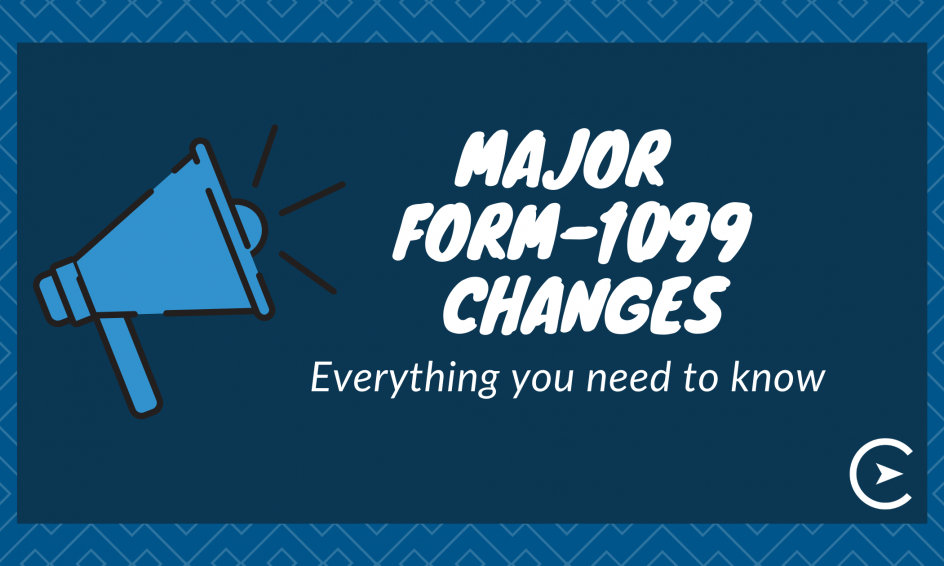One of the major changes in 2020 for business owners working with contractors and freelancers is how to report these contractor payments to the IRS. Previously, businesses issued and contractors received 1099-MISC forms to report income generated from freelance activities. That has changed this year, as the IRS has introduced Form 1099-NEC to report “Non-Employee Compensation”. Form 1099-MISC still exists for true miscellaneous expenses, but the bulk of independent contractor income will now be reported on 1099-NEC.
Here’s everything you need to know as you begin to focus on preparing for tax season:
What’s Changing? Form 1099-MISC vs. 1099-NEC
For those businesses who paid a contractor more than $600 in 2020, you are now required to fill out Form 1099-NEC instead of Form 1099-MISC. These are payments that are made to individual contractors, gig workers, or self-employed individuals hired to complete work for a company. Previously, companies reported these payments in Box 7 on Form 1099-MISC. For 2020 and beyond, this income will now be reported on Form 1099-NEC.
Guidance from the IRS summarizes if the following four conditions are met, you must generally report a payment as NEC:
- You made the payment to someone who is not your employee.
- You made the payment for services in the course of your trade or business (including government agencies and nonprofit organizations).
- You made the payment to an individual, partnership, estate, or, in some cases, a corporation.
- You made payments to the payee of at least $600 during the year.
There are some general exceptions to these rules, however for payments that do not have to be reported on Form 1099-NEC. The major exceptions include:
- Payments made to a corporation (C Corp, S Corp, and LLCs treated as a corporation for tax purposes). This information can be found on a contractor’s Form W-9.
- Payments for merchandise, telegrams, telephone, freight, storage, and similar items.
- Payments of rent to real estate agents or property managers.
- Wages paid to employees. DO NOT file a 1099 for W-2 employees as there are penalties for misclassifying employees
- Business travel allowances paid to employees
- Payments made to tax-exempt organizations
For detailed information and specifics, refer to the IRS General Information Page.
So what is a Form 1099-MISC used for now?
The Form 1099-MISC doesn’t go away entirely but is now simply used for miscellaneous payments rather than contractor payments. According to the IRS General Instructions, Form 1099-MISC must be filed if:
- At least $10 in royalties (see the instructions for box 2) or broker payments in lieu of dividends or tax-exempt interest (see the instructions for box 8).
- At least $600 in:
- Rents (box 1);
- Prizes and awards (box 3);
- Other income payments (box 3);
- Generally, the cash paid from a notional principal contract to an individual, partnership, or estate (box 3);
- Any fishing boat proceeds (box 5);
- Medical and health care payments (box 6);
- Crop insurance proceeds (box 9);
- Payments to an attorney (box 10) (see Payments to attorneys, later);
- Section 409A deferrals (box 12); or
- Nonqualified deferred compensation (box 14).
- In addition, use Form 1099-MISC to report that you made direct sales of at least $5,000 of consumer products to a buyer for resale anywhere other than a permanent retail establishment.
When are these forms due to the IRS?
Form 1099-NEC must be filed on or before February 1, 2021, using either paper or electronic filing procedures
Form 1099-MISC must be filed by March 1, 2021, if you file on paper, or March 31, 2021, if you file electronically.
How to file 1099-NEC and 1099-MISC
First, online forms can be downloaded from the IRS website.
Both forms have two copies that need to be filled out with the same information. Copy A sent to the IRS and Copy B is sent to the contractor. If you are the recipient of a 1099-NEC or 1099-MISC, you do not need to file the 1099 but you should use the information in those forms to properly report your income on Form 1040 Schedule C.
For Payers
The process for collecting 1099 information from contractors does not change, just the form you are filing the information changes. So if you paid a contractor more than $600 for 2020, request a Form W-9.
The Form W-9 will provide you with the following information necessary to fill out the 1099:
- Legal name or business name if applicable
- Business entity (sole proprietor, partnership, corporation)
- Current address
- Taxpayer identification number (SSN, ITIN, or EIN)
It is the responsibility of the payer to file Form 1099-NEC and 1099-MISC for contractors they work with. If you are using an accounting or payroll service provider, check whether they will handle the preparation of and mailing of Form 1099s through the mail or electronically. Business owners will likely need to provide Form W-9’s in order for the provider to complete these forms. Also, double-check your bookkeeping records to confirm amounts that were paid to contractors are correct.
Some areas require you to also file 1099 forms with the state. This has been evolving throughout the year as tax regulations are changing. Check with your CPA on the state by state compliance. As of 12/1/20, the following states do not require 1099 forms to be submitted:
- Alaska
- Florida
- Illinois
- Nevada
- New Hampshire
- New York
- South Dakota
- Tennessee
- Texas
- Washington
- Wyoming
This is a pretty significant change for those working with contractors so make sure you are aware and get with your CPA to help advise on these changes!

